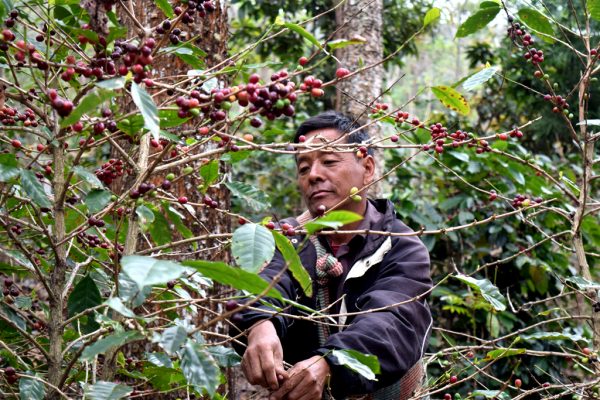
Kohima (EMN):
55-year-old Phanbem Kithan, a progressive farmer from Wokha village, in Wokha district, has been growing coffee for the past 15 years. He tried his hands at coffee plantation in 2002. Since then, he has devoted his life to growing the crop. The harvest from his crops has been increasing with each passing year.
The coffee kiosk set up by the Land Resources department at the Hornbill Festival in 2016 at Kisama, and one which was the main attraction of locals and tourists alike, was supplied by Kithan.
The farmer credits his success to the Coffee Board of India (CBI) which he said has been with him at every step of his journey in growing coffee. The journey had not been easy in the initial period of his venture. However, the logistic support and assistance rendered by the CBI has enabled him to extend his plantation every year.
Today, in an area of 6.5 hectares, Kithan has 30,000 coffee plants of Arabica coffee and Robusta coffee. He said to be expecting a harvest of 1, 000 kilograms of coffee this year; it will generate an income of possibly Rs. 1, 60, 000.
Kithan has undergone about 14 training events in various parts of India. He also won the ‘Best Nursery Maintenance’ award of the Coffee Board of India for 2014-2015; he was awarded with a certificate and a cash prize of Rs 20,000.
The CBI, he said, is highly appreciative of the coffee from Wokha as the ‘best quality and organic’ although some improvements are still required to improving the colour of the coffee. He said also that there was no problem in marketing–the produce is sent directly to the coffee board.
To encourage farmers to take up coffee plantation, Kithan has set up a nursery, since 2009, with the assistance from the CBI for maintenance. Saplings are distributed to interested farmers after inspection and after ‘analyzing’ their ‘dedication,’ he said.
Offering advice from his expertise, Kithan said that a good and healthy sapling with at least 5-12 leaves can last for about 100 years, which should begin from the nursery itself. He expressed confidence that Wokha would be covered by coffee plantations in a few years time, and that the district would be able to yield 2-3 truckloads of coffee every year.
Stating that there was no loss in growing coffee, Kithan hoped that the state of Nagaland would take up the crop. The land is blessed with highly favourable climatic conditions and the soil type is suited for production of coffee.
With the expertise that he has gained over the years, Phanbem Kithan is more than willing to assist and share his knowledge with anyone who is interested in taking up coffee plantation.
It was informed that the department of Land Resources had distributed 13.40 lakh coffee seedlings to farmers covering an area of 670 hectares. Coffee plantation in the state has been developed by the department in collaboration with the CBI. 920 hectares have been developed spreading over the eleven districts of the state.
The department has also prepared a five-year plan for development of coffee in Nagaland covering an area of 5000 hectares across the state by 2019-2020; 10,000 households have been identified for this plan and will be implemented in convergence with the board.
According to the plan, the land to be used for coffee plantation is 917 hectares during 2016-2017; 1190 hectares during 2017-2018; 1710 hectares during 2018-2019; 953 hectares during 2019-2020.
Taking advantage of tree species, including plantation crops developed through watershed programmes, coffee being a shade-loving crop has shown easy acceptance by the rural community as either main or subsidiary crop.
Unlike decades ago when farmers stopped coffee plantation due to lack of marketing avenues, it is hoped that the department working on marketing strategies will encourage more farmers to grow coffee. Another prospect is that Nagaland would emerge to produce quality organic coffee for export and local consumption.
During a visit to the state in 2016, Dr Pieter Vermuelen, a coffee expert from South Africa, commented that Nagaland had the potential to developing a sustainable economy through exporting coffee.
source: http://www.easternmirrornagaland.com / Eastern Mirror / Home> Top News> Current Article / by Akono Tsukru / April 04th, 2017

